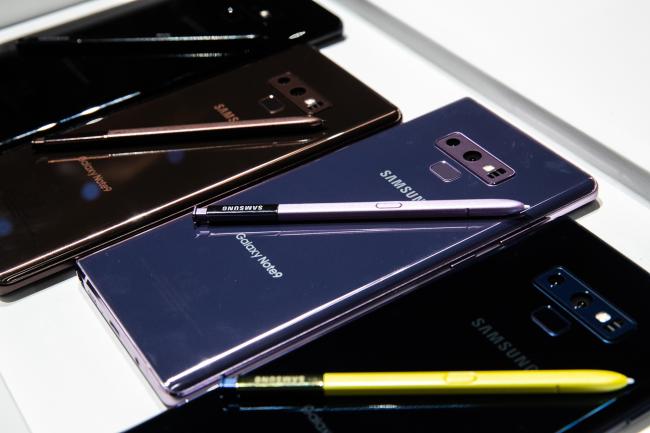(Bloomberg) -- In a meeting that was unthinkable 19 months ago, South Korea’s president will this week introduce the head of the country’s biggest conglomerate to North Korean leader Kim Jong Un in Pyongyang.
The parley caps a remarkable period for Jay Y. Lee, vice chairman of Samsung (LON:0593xq) Electronics (KS:005930) Co., who since the start of 2017 has been arrested, tried and jailed before being released a year later. Meanwhile, President Moon Jae-in is finding his political fortunes tied to the company and South Korea’s other conglomerates amid a sputtering economy, even though he swept to an election victory promising to rein in the power of the chaebol.
While close links between politicians and chaebol aren’t new in South Korea, Moon talked tough about cutting that influence before his election, a poll that only took place because his predecessor was brought down by a bribery scandal involving Lee. With exports of semiconductors one of the few bright spots in an economy that’s showing signs of strain, the country’s reliance on its most profitable company is deepening and thus reducing regulatory pressure on Samsung.
“The government needs Samsung now,” said Chung Sun-sup, chief executive officer of corporate analysis firm Chaebul.com. “Samsung also has nothing to lose by complying.”
The president’s office and Samsung haven’t said what Lee would discuss on the trip. The company doesn’t have any businesses in North Korea, which is subject to international sanctions.
Lee’s trip comes less than two months after he appeared at a photo opportunity at Samsung’s latest and biggest chip factory in Pyeongtaek, south of Seoul, where he met with Kim Dong-yeon, South Korea’s finance minister. There, Samsung pushed for lower regulations on pharmaceuticals, construction of plants, mobile networks and other business areas, which the minister planned to look into, Kim told reporters after the meeting.
When Moon was elected in May last year, expectations were high that the government would force the chaebol to improve their corporate governance and reduce the power held by founding families such as the Lees at Samsung.
In a sign of how that dynamic has changed, Moon has called for easing a law that limits companies from owning a bigger chunk of a bank, generating criticism by activists that it could pave the way for chaebol families to use financial units to increase their control.
Samsung has an outsized influence on South Korea. Not only is it the biggest private employer in the country, but its flagship electronics business alone accounts for a staggering 20 percent of the nation’s benchmark Kospi index, and it has five other affiliates in the top 30.
Lee, son of South Korea’s richest man, was arrested in February 2017 on charges including bribing a friend of former President Park Geun-hye. After a six-month trial, he was sentenced to five years in prison, a term reduced and suspended earlier this year. He is appealing the remaining jail term while prosecutors seek a harsher punishment. The Samsung heir has consistently denied any wrongdoing.
On Tuesday, Lee and other chaebol leaders will join Moon at his third summit with the North Korean leader. It will be the second public meeting between Moon and the Samsung boss this year after a brief handshake at the opening of an Indian smartphone factory.
Moon’s chief of staff said Monday it isn’t unusual for conglomerate chiefs to visit North Korea on the occasion of a summit, as they have previously done so. Samsung declined to comment.
While Samsung is coming off a year of record profits, South Korea’s economy and Moon’s own approval ratings are struggling. The president’s so-called wage-led growth plan is failing to increase jobs, with the August unemployment rate hitting the highest since early 2010 and consumer confidence tumbling to its lowest in 17 months.
Companies filing for bankruptcy jumped 9.2 percent to 994 this year through July, the most ever for the period, according to Supreme Court of Korea data going back to 2012.
“Slow economy means a halt in chaebol reforms,” said Bruce Lee, chief executive officer at Seoul-based Zebra Investment Management. “It’s become really hard to reform chaebol because they are the biggest employers.”
That’s not the only concern for South Korea. As one emerging-market nation after another feels the impact of rising U.S. interest rates and the trade spat between China and the U.S., the importance of foreign reserves is greater than ever and making exports more important.
That’s where Samsung becomes a powerful ally with about 90 percent of its revenue coming from overseas sales, where it leads the world in smartphones and TVs. The Suwon-based company is also the world’s biggest maker of semiconductors and, along with local rival SK Hynix Inc., a member of another chaebol, it dominates supply of critical memory chips.
Semiconductors accounted for 23 percent of South Korea’s exports last month, more than any other product. That forces Moon and Samsung into a delicate situation. Too much reliance on the chaebol could further harm his political stock, but it also means any downturn in chip demand spells trouble for the company and Asia’s fourth-largest economy. “Its pricing has been very good and margins for Samsung have been really strong,” said Erik Zipf, head of emerging market equities at DuPont (NYSE:DWDP) Capital Management “We don’t think that’s sustainable. We think as capacity comes on, that’ll kind of reduce margins.”
Still, Samsung continues to play along. Two days after the meeting with the finance minister, Samsung announced a three-year plan that includes 180 trillion ($160 billion) of investment, with the promise to hire 40,000 more people. That’s a shot in the arm for a president under pressure and a company under scrutiny.
“Reforms are dying on the vine,” said Kwon Young-june, a professor who researches corporate governance at Seoul’s Kyung Hee University. “The government will find itself more and more in need of conglomerates as long as it is fixated on quick results rather than long-term reforms.”
